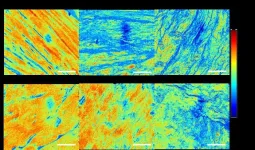(Press-News.org) Scientists have uncovered a powerful ally in the fight against neurodegenerative diseases: a nucleolar complex that plays a pivotal role in maintaining cellular health through protein homeostasis (proteostasis), by which cells maintain the balance and proper functioning of their proteins. By suppressing this complex, researchers have shown it’s possible to dramatically reduce the toxic effects of Alzheimer’s-causing proteins, boosting the cell’s natural defenses through enhanced degradation of hazardous proteins. This mechanism regulates proteostasis across tissues by modulating TGF-β signaling, a pathway involved in cell growth, differentiation, and tissue homeostasis. This breakthrough opens exciting new possibilities for the development of new therapies that could slow or even prevent diseases like Alzheimer’s, offering hope for a future of healthy aging.
As we age, the intricate balance of protein homeostasis (proteostasis) — the system responsible for maintaining cellular health by ensuring proteins are correctly folded— begins to falter. This decline leads to the accumulation of toxic protein aggregates, a hallmark and an underlying cause of neurodegenerative diseases such as Alzheimer’s disease. A new study led by Hebrew University researchers Prof. Ehud Cohen and the student Huadong Zhu from the Department of Biochemistry and Molecular Biology at the Institute for Medical Research Israel–Canada (IMRIC) in collaboration with the lab of Dr. Yonatan Tzur of the Alexander Silberman institute of Life Science, sheds light on a promising new way to address this issue, with implications that extend far beyond basic research.
The research identifies that a nucleolar complex, FIB-1-NOL-56, is a central player in the regulation of proteostasis at the cellular and organismal levels. By suppressing the activity of this complex, the team observed a marked reduction in the toxic effects of Alzheimer’s-associated Aβ peptide and another disease-causing protein, in model organisms. This discovery not only deepens our understanding of how the body manages cellular stress but also offers hope for future treatments that could delay or prevent a myriad of devastating neurodegenerative diseases.
“Our findings go beyond the lab bench,” explains Prof. Cohen. “Neurodegenerative diseases affect millions of people worldwide, impacting families and caregivers. By uncovering how cells communicate to maintain protein integrity, we’re opening the door to the development of preventive therapeutic approaches that could delay disease onset and significantly improve quality of life of the elderly”.
This research has a real-world relevance that’s hard to ignore. Neurodegenerative diseases like Alzheimer’s disease touch nearly every family, affecting not just patients but also their loved ones. The ability to slow or prevent these conditions could mean more meaningful moments with aging parents, fewer health crises, and a longer period of independence for millions of older adults.
As the team looks ahead to translating these discoveries into treatments, the potential to improve the lives of countless individuals grows ever clearer. With continued research, this approach could lead to a future where aging does not come hand-in-hand with the specter of neurodegenerative disease.
END
Unlocking proteostasis: A new frontier in the fight against neurodegenerative diseases like Alzheimer's
2025-01-03
ELSE PRESS RELEASES FROM THIS DATE:
New nanocrystal material a key step toward faster, more energy-efficient computing
2025-01-03
CORVALLIS, Ore. – Scientists including an Oregon State University chemistry researcher have taken a key step toward faster, more energy-efficient artificial intelligence, and data processing in general, with the discovery of luminescent nanocrystals that can be quickly toggled from light to dark and back again.
“The extraordinary switching and memory capabilities of these nanocrystals may one day become integral to optical computing – a way to rapidly process and store information using light particles, which travel faster than anything in the ...
One of the world’s largest social programs greatly reduced tuberculosis among the most vulnerable
2025-01-03
Brazil’s Bolsa Família Program (BFP), one of the world’s largest conditional cash transfer programmes, was responsible for the reduction of more than half the number of tuberculosis cases and deaths among those living in extreme poverty and indigenous groups, shows a large study coordinated by the Barcelona Institute for Global Health (ISGlobal), a centre supported by “la Caixa” Foundation, the Institute of Collective Health, and the CIDACS-FIOCRUZ in Bahia, Brazil. The findings, published in Nature ...
Surprising ‘two-faced’ cancer gene role supports paradigm shift in predicting disease
2025-01-03
UNDER STRICT EMBARGO UNTIL 10AM (UK TIME) FRIDAY 3 JANUARY 2025.
Peer reviewed | Observational study | Cells
A genetic fault long believed to drive the development of oesophageal cancer may in fact play a protective role early in the disease, according to new research published in Nature Cancer. This unexpected discovery could help doctors identify which individuals are at greater risk of developing cancer, potentially leading to more personalised and effective preventive strategies.
“We ...
Growing divide: Agricultural climate policies affect food prices differently in poor and wealthy countries
2025-01-03
“In high-income countries like the U.S. or Germany, farmers receive less than a quarter of food spending, compared to over 70 percent in Sub-Saharan Africa, where farming costs make up a larger portion of food prices,” says David Meng-Chuen Chen, PIK scientist and lead author of the study published in Nature Food. “This gap underscores how differently food systems function across regions.” The researchers project that as economies develop and food systems industrialise, farmers will increasingly receive a smaller share of consumer spending, a measure known as the ‘farm ...
New approaches against metastatic breast cancer: mini-tumors from circulating cancer cells
2025-01-03
Tumor cells circulating in the blood are the “germ cells” of breast cancer metastases. They are very rare and could not be propagated in the culture dish until now, which made research into therapy resistance difficult. A team from the German Cancer Research Center (DKFZ), the Heidelberg Stem Cell Institute HI-STEM* and the NCT Heidelberg** has now succeeded for the first time in cultivating stable tumor organoids directly from blood samples of breast cancer patients. Using these mini-tumors, the researchers ...
Loneliness linked to higher risk of heart disease and stroke and susceptibility to infection
2025-01-03
Interactions with friends and family may keep us healthy because they boost our immune system and reduce our risk of diseases such as heart disease, stroke and type 2 diabetes, new research suggests.
Researchers from the UK and China drew this conclusion after studying proteins from blood samples taken from over 42,000 adults recruited to the UK Biobank. Their findings are published today in the journal Nature Human Behaviour.
Social relationships play an important role in our wellbeing. Evidence increasingly ...
Some bacteria evolve like clockwork with the seasons
2025-01-03
Like Bill Murray in the movie “Groundhog Day,” bacteria species in a Wisconsin lake are in a kind of endless loop that they can’t seem to shake. Except in this case, it’s more like Groundhog Year.
According to a new study in Nature Microbiology, researchers found that through the course of a year, most individual species of bacteria in Lake Mendota rapidly evolved, apparently in response to dramatically changing seasons. Gene variants would rise and fall over generations, yet hundreds of separate species would return, almost fully, to near copies of what they had been genetically prior to a thousand or so generations of evolutionary pressures. (Individual microbes ...
New imaging technique offers insight into Achilles tendon injury recovery
2025-01-03
Achilles tendon injuries are common but challenging to monitor during recovery due to the limitations of current imaging techniques. Researchers, led by Associate Professor Zeng Nan from the International Graduate School at Shenzhen, Tsinghua University, have applied Mueller matrix polarimetry, a non-invasive imaging method, to more accurately observe and evaluate the healing of Achilles tendon injuries. This technique offers unique insights by capturing the subtle changes in tendon tissue without needing labels or dyes, allowing for more natural tissue characterization.
The study used Mueller ...
Bereavement science researcher provides insights on parasocial grief
2025-01-03
MIAMI, FLORIDA (Jan. 2, 2025) – Many people are surprised by the intensity of their response when a well-known person dies, and their feelings of sadness may last longer than they expect. In fact, that sadness and grief can be intense, and preliminary research suggests that grief after the death of a public figure looks very similar to grief over our personal relationships and can have comparable levels of intensity.
Wendy Lichtenthal, Ph.D., a bereavement science researcher, is available to discuss “parasocial grief” – that which occurs when a celebrity, political ...
New research aims to improve bridge construction in Texas
2025-01-02
A groundbreaking method for bridge construction is set to enhance performance, reduce construction time, and cut costs for future bridges across Texas.
Dr. Kinsey Skillen, assistant professor in the Civil and Environmental Engineering Department at Texas A&M University, was named Principal Investigator (PI) of the Texas Department of Transportation (TxDOT) research project titled “Develop/Refine Design Provisions for Headed and Hooked Reinforcement.”
The 42-month project, which received nearly $1 million in funding, is a joint effort between the Texas Transportation Institute and the University of Texas at San Antonio (UTSA) exploring more efficient methods ...




